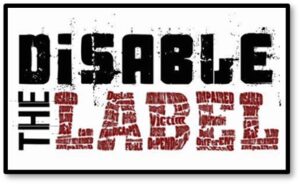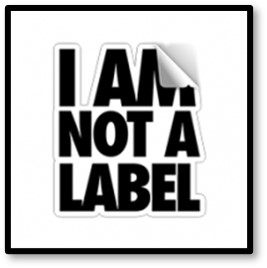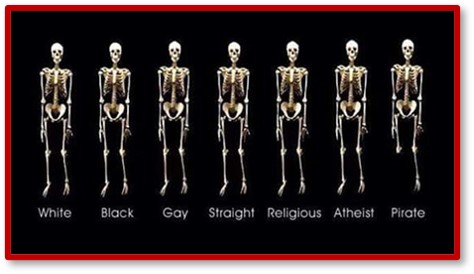Monday Author: Susanne Skinner
 We are born into this world with minimal labels. Some are necessary to define us as we begin our journey but they are not binding. We begin as a boy or a girl, members of an ethnic race, and citizens of our country of origin.
We are born into this world with minimal labels. Some are necessary to define us as we begin our journey but they are not binding. We begin as a boy or a girl, members of an ethnic race, and citizens of our country of origin.
But labels get more dangerous and complicated as we get older. They become filters we apply, placing people into categories. It’s a bad habit and a hard one to break.
Let’s make a serious effort to disable the label when it comes to people.
Labels Are for Things
I am driven by the need to have order in my life. My OCD tendencies rise to the top when it comes to organization. I must know where things are and if they aren’t readily identifiable, I label them. This practice serves me well, maintaining order in my physical world. Fabric bins are labeled, along with kitchen containers of flour and sugar and my craft supplies and baking pans.
Labeling things give me a sense of harmony, and a way of immediately locating items. I make no apologies for this—it’s who I am.
The bump in the labeling road is people, because people aren’t things. Using labels to describe humans dismisses who they are as individuals and tends to create biased metrics used to categorize others.
One of the most effective ways to prevent this is education. Learning encourages us to look beyond a label, seeking additional awareness and knowledge. It builds bridges between narrow assumptions and a broader truth. Adopting a label without considering its truth is a harmful and a limiting way to live.
Generic labels, when applied to people, are often judgment-related. They encourage stereotypes, hearsay, unfounded fears and the inability to separate a person from the word. A label lumps diverse groups of people under a generic name and marginalizes individual identity.
I Am Not a Label
Until the moment you are. Some labels belong where they are placed. When we label a person, we imply it is a permanent reflection of that individual’s moral character. It becomes the person’s past and present, putting them into an all-or-nothing category. In most cases I strive to avoid this but there are exceptions to my thinking.
 It’s important to offer a sidebar about labels people earn. Members of any racist group, Neo-Nazis, those who carry the conviction of pedophile—that is your label. Specific actions, beliefs and behaviors uphold these labels within society.
It’s important to offer a sidebar about labels people earn. Members of any racist group, Neo-Nazis, those who carry the conviction of pedophile—that is your label. Specific actions, beliefs and behaviors uphold these labels within society.
You are still a person, but the ideas and policies you embraced became the defining character traits that label represents, putting you in a category that reduced you to what the label signifies.
The behavior that goes with the label defines you to the rest of the world and I make no apology for using it. Dehumanizing others dehumanizes you.
The Origin of Labels
Labels have been a means of discrimination for thousands of years. Ugly, insulting and hurtful words define people and make them feel inadequate. Some labels we learned as children, from authority figures like parents or teachers. As children, they are easy to absorb, repeating them without understanding their meaning.
Labels are powerful and words can be weapons. They have the power to warp our perceptions of people by promoting unconscious discrimination. A person’s race, sexuality, socioeconomic status or geographic origin does not define who they are. Human beings are born with unlimited potential. By labeling someone unfairly, we restrict their growth as well as our own.
On the other hand, it is ok if people want to label themselves. They have a right to be called whatever they want but at the same time it’s important to acknowledge the risk. Some people find freedom in a label, but others find them damaging and restrictive.
Political Labels
Negative labels dominate the Internet and there is no greater wasteland than social media. This is especially true when it comes to politics. The labeling sharpie strikes without mercy.
We are fanatically polarized when it comes to politics and need look no further than the 2020 Presidential election for proof. There are a number of ways to identify our political beliefs but most people fall into the category of Republicans or Democrats.
But these labels do not describe who we are as people. They fail to include details about our values and beliefs and create the assumption that a political label is all that is needed to judge a person. It lumps people into a category that is either good or bad, depending on the point of view.
I find politics to be full of nuance and refuse to place myself in any mainstream political category. I can be Democratic on one issue and Republican on another—and sometimes I am stuck in the middle. I have lost lifetime friendships because I would not commit to or denounce a party.
Social media felt the same. People began trash talking the politicians, parties, and processes, labeling and insulting everything and everyone. It was painful to watch and I found myself stepping away from the computer and binging on Netflix.
We are more than our political convictions: We are humans, we are Americans. And we are all the same on the inside.
We’re All the Same on the Inside
Negative labels have become the norm on social media, with insults flying fast and furious between disagreeing parties. Labeling others helps us define who we are and who we are not and allows us to side-step our own uncomfortable realities.
Placing a label on someone reduces the complexity of the human spirit. If we cling to the labels, we grew up with they become our bias. The only way out is to stop labeling people with behaviors and characteristics. Replace them with curiosity, knowledge and awareness. We are all more than what meets the eye.

